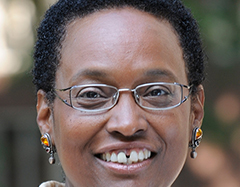August 18, 2020
 As protests were being held across the United States for racial and social justice in early June, Robbin Chapman gave a public, livestream lecture on the roles that academic institutions, faculty, and others in science, technology, engineering, and math (STEM) can play in improving inequitable STEM student outcomes.
As protests were being held across the United States for racial and social justice in early June, Robbin Chapman gave a public, livestream lecture on the roles that academic institutions, faculty, and others in science, technology, engineering, and math (STEM) can play in improving inequitable STEM student outcomes.
Chapman was wrapping up her two-year term as a Sigma Xi Distinguished Lecturer. She is an associate dean of Diversity, Inclusion, and Belonging at the Harvard Kennedy School. She is also an adjunct associate professor of education at the Graduate School of Education at the University of Pennsylvania.
The lecture, “Rendering the Invisible Visible: Student Success in Exclusive Excellence STEM Environments,” was cohosted by the Linda Hall Library and the Kansas City Sigma Xi Chapter.
Chapman described institutional bias as consisting of positive bias, which elevates certain groups, and negative bias, which normalizes unfair treatment of other groups. Both types need to be noticed.
“What are the institutional drivers of inequity that for many of us are either invisible, or it’s just the water we swim in and we don’t realize that it’s having a real impact on real people?” she asked.
Chapman says that the opposite of exclusive STEM communities are inclusive communities, which engage in self-growth and have “intentional and sustained engagement across an academic community.” She provided examples of what people at higher education institutions can do to improve their inclusiveness to support underrepresented minority students.
Distinguished Lecturers are available as speakers for Sigma Xi chapter events. Chapters may apply to Sigma Xi by March 1 for a subsidy that pays a portion of the cost to host a lecturer.
Chapman’s lecture recording can be found on the Linda Hall Library website.